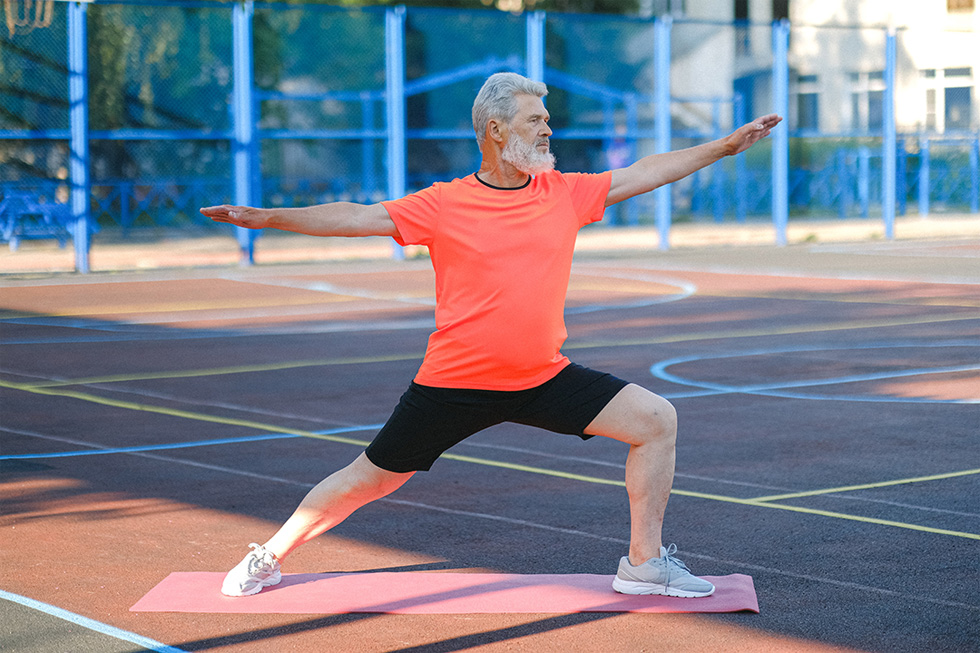 EXERCISE
EXERCISE
Permission to Exercise Is Granted (to Yourself!) - How to Overcome Misplaced Guilt.
This article was originally published at OlderBeast, whose mission is to help 40+ guys “double down” on body-and-soul health for the 2nd half of their life.
Taking care of yourself, to maximize the second half of life, is a constant challenge. It keeps reappearing in different ways – no matter how healthy and motivated you are. Its toughest form, though, keeps you stuck at the starting line for health: difficulty sustaining regular exercise. And when you don’t work out regularly, it’s harder to sustain good nutrition and find tranquility-of-spirit, too. So, overcoming this challenge is triply vital.
The two most-cited reasons for not working out? “Don’t have time” and the vaguer “can’t get motivated.” For many guys, especially at the mid-career and younger-kids stage, there’s a subconscious thread connecting these time/motivation challenges.
Deep down, I feel guilty taking time to exercise… it means I’m letting important work and family things slip.
Let’s look at this deep inhibitor, and how you can overcome it… at how you can give yourself “permission” to exercise.

view and download helpful pdfs on exercise below>
![]()
We encourage you to explore our library or blog for numerous in-depth articles on exercise.
Permission to Exercise: Psychology & Biology
Maybe I should do another hour of work tonight. Or take the kids, to give my wife a break. Or spend time with her, of course.
Those are powerful “should” feelings, brother. They often win the “Battle of Should” vs. that workout you “should” do today.
Let’s look at this as a scientist sees it. Positive rewards you feel from exercise (via release of the neurotransmitters dopamine, serotonin, oxytocin and endorphins) are outweighed by negative-emotion neurotransmitters released by not doing work or family things you have on your mind.
This is biological, so let’s focus on a biologically-savvy solution. The task at hand: make positive results of exercise feel a bit more positive, and negative reactions a bit less negative.
The idea is to launch and follow an intentional plan until, for a few hours each week, you’ve tipped the balance just a desperately-needed bit toward your own fitness and wellness.
Making exercise feel more rewarding – that’s the easy part. By hook or crook, if you get 3+ days a week (ideally 4+) for 12 weeks, you’ll literally “rewire” your brain and increase the flow of positive neurotransmitters. The joke may say you only feel “runner’s high” when jogging past the marijuana dispensary…but jokes aside, this stuff is real.
And if you’re super-busy and feeling in “survival mode,” only 1-2 of these workout days need to be during the work week.
The harder part: How to “temporarily suspend” negative-preventive feelings from interfering with your 12-week fitness surge. Let’s look at this challenge, and solutions, under work and family circumstances.
Challenge #1: Work Demands
Work demands that preclude a few hours of work-week exercise boil down to two things: Scheduling problems, and the nagging worry a few incremental work hours are make-or-break to your success.
Especially in corporate or client-service settings, your calendar fills up fast. Before you know it, meetings and calls encroach morning (there goes the a.m. workout), noon (so much for hitting the gym during lunch), and evening (barely time to get home for dinner, let alone an evening workout).
The solution is so simple you’ll think I’m oversimplifying. Just figure out your bare-minimum exercise needs during the work week, and put them on your calendar. Then firmly say “I can’t do it at that time” to work-related requests. You DO have something else, important, already scheduled!
Yeah, occasionally you’ll choose to reshuffle because the work thing is truly critical…but normally not. Once you actually prioritize a little you/health time on a few occasions and realize no one tars-and-feathers you for it…you’ve gained some control, dude.
The nagging “success” worry? For this, a state-of-mind adjustment is needed. At least an experimental one, that later becomes an experience-based conclusion. Almost always, you are *more* productive and creative, not less, if you get away from work for a short while and recharge.
As males in modern society, there’s a siren song of “work more.” In the vast majority of cases, though, that extra hour at night, those emails while inhaling a sandwich at your desk…are symptoms of imbalance and inefficiency, not of success-hastening grit.
Throughout history, people have done great things based on faith. Now, you need to have faith that exercising for 1.5-3 hours during the workweek is NOT going to condemn you to a life of poverty and career shame.
Challenge #2: Family Needs & Wants
With family, there’s a strong pull to do things with and for others…not for yourself*.
We want to be great husbands/partners and dads. And siblings and adult sons to our families-of-origin. And, of course, time with family is key to our own happiness (it’s not just “for them”…it’s for ourselves).
But putting yourself on an unhealthy life trajectory isn’t the solution, man. And even though your wife needs and deserves a break (often more than you), I’ll bet a case of beer she’s not in favor of you being on the early-heart-attack plan.
So here are ideas for balancing things:
- Be fitness-planning-oriented with your wife or significant other. How does the week look, what times would I like to work out, when can I give you a break? This type of planning applies to kids over a certain age, too.
- Seek couple time together while you are staying fit. Walking, hiking, running (or yoga class) are great guy/gal together activities.
- Involve kids in your own physical fitness (and vice versa). For younger kids, think jogging stroller, or bike seat or trailer. Practice kids’ sports with them. If you need to drive to a team practice, stay and jog around the field while they’re practicing. Eventually, see if they want to start doing fitness activities you like to do. This will be hit or miss, but sometimes it just takes a few years for them to come around.
With kids, also remember you’re modeling behavior, either good or bad. And having kids observe you investing in your own health is a lesson for them, and part of being a good father.
*I know women reading this might think “Oh come on…this is NOTHING like what women face. I’m not comparing genders on this family-demands dimension (I’m not that dumb). Just saying guys have challenges, too.
helpful PDFs for you

